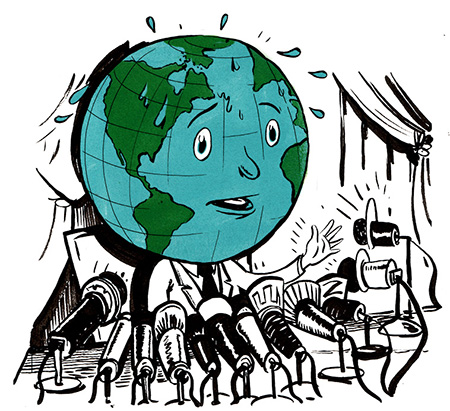ZEITGUIDE to Global Warning
Most of you know that I am very concerned about the dangers of climate change. Dick Cheney said “if there is even a 1% chance of a terrorist attack, we must do everything in our power to be prepared”. 95% of the scientific community agrees that climate change is happening, and is a dramatic threat to the planet, yet far less is being done to fight climate change than to fight terrorism. My friend Brad Grossman just put out a new Zeitguide that shows a correlation between climate change and terrorism, or at least, political and economic instability. Please check it out. Thanks for caring. -Shepard
Americans are coming around to the view that the climate is indeed changing—but a majority still don’t see it posing a serious threat in their lifetime, according to Gallup.
But three articles and reports we tracked in the past week said we better start worrying.
Not because of melting glaciers, species die-off, acidifying oceans, or super storms—among the aspects we discussed in ZEITGUIDE 2014—but because climate change will certainly hurt businesses, the global economy, and political stability.
In sum, because global warming increases the likelihood of war…
The Harvard Business Review’s piece, “Resilience in a Hotter World,” enumerates the financial toll of “wild weather”: 2011 Thailand floods stalled car production, in 2012 super storm Sandy cost New York businesses $6 billion, the 2013 Philippines Typhoon caused $14 billion in damage. And there’s no end in sight: so long as the planet continues to warm, destructive weather will only increase.
Right along with temperatures, commodity prices are also trending sharply upward.
The Wall Street Journal also reported last week that food prices are surging because of droughts. Lack of rainfall in California, Texas, Brazil, and Southeast Asia is driving up the cost of meat, dairy, fruits, vegetables, sugar, coffee, and cooking oils—and restaurants and retailers are feeling the pinch.
Most alarming is the impact food inflation can have in emerging markets, where households spend a larger proportion of their income on food than in wealthy nations. The WSJ pointed out that the 2008 riots in Haiti, South Asia and sub-Saharan Africa were indirect reaction to rising food prices. Soaring wheat prices helped spark the Arab Spring.
The final piece arrived in last week’s report from the American Association for the Advancement of Science was called, plainly,What We Know. Amid risk assessment related to fires, sea levels and more, it summarized the U.S. military’s research into the national security implications of climate change:
Climate change can influence resource competition and place new burdens on economies, societies, and government institutions. The reports call attention to the fact that these burdens can trigger violence. There is a growing recognition that the displacement of large numbers of people due to water scarcity and agricultural failure, as in the recent history of Syria, can exacerbate tensions that can lead to civil unrest.
It was almost 10 years ago that Michael Shellenberger and Ted Nordhaus shifted the entire conversation about the politics of global warming with their provocative essay, “The Death of Environmentalism.” To make headway against climate change,environmentalists would have to rethink everything. “The solutions we dream up,” they wrote, “depend on how we structure the problem.”
This trio of reports suggest everyone should be having that rethink: governments, NGOs, multinational corporations, security forces, and ourselves.
And then conversation about how to deal with global warming will really heat up.
……….
I know…. not the most uplifting Zeitguide conversation, but it’s still Zeitgeist and our job is to make sure you know what you need to know to move forward.
Get ZEITGUIDE 2014 here for more on the current thoughts on the subject of Climate Change..
Keep Learning

